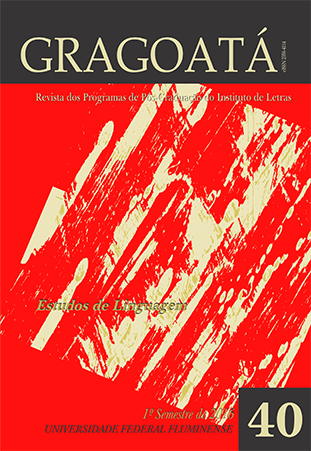A VOCALIZAÇÃO DA CONSOANTE LATERAL EM CODA SILÁBICA EM UMA VARIEDADE DE PORTUGUÊS BRASILEIRO: ANÁLISE SOCIOLINGUÍSTICA EM TEMPO REAL
DOI:
https://doi.org/10.22409/gragoata.v21i40.33376Palavras-chave:
Variação linguística, Português brasileiro, Vocalização da lateral em coda silábica, Análise em tempo realResumo
A análise de regra variável em tempo real (LABOV, 1972, 1994) da vocalização da consoante lateral /l/ em coda silábica (canal~cana[w], Brasil~Brasi[w]) no português falado em Flores da Cunha (RS) revelou progresso na aplicação da regra entre 1990 e 2008-2009. O incremento na vocalização acompanhou mudanças econômicas e sociais ocorridas no pequeno município, fundado por imigrantes italianos no final do século XIX. O grupo etário jovem mostrou-se condicionador da aplicação da regra, o sexo/gênero feminino completou a aquisição da forma vocalizada. No contexto fonológico seguinte, a tendência a vocalizar passou a ser exercida pelas consoantes altas e vogais posteriores, além das consoantes labiais. Em relação à tonicidade da sílaba, o processo deixou de ter o efeito da sílaba tônica para ser afetado apenas por sílaba átona. A proporção total de vocalização passou de 12% em 1990 a 77% em 2008-2009. O aumento expressivo na aplicação da regra acompanhou o aumento da população urbana e da realização de atividades econômicas nessa área, reduzindo o falar dialetal italiano e seu contato com o português, o que poderia ter refreado a vocalização.
Downloads
Downloads
Publicado
Edição
Seção
Licença
AUTORIZAÇÃO
Autores que publicam em Gragoatá concordam com os seguintes termos:
Os autores mantêm os direitos e cedem à revista o direito à primeira publicação, simultaneamente submetido a uma licença Creative Commons Atribuição 4.0 Internacional (CC BY 4.0), que permite o compartilhamento por terceiros com a devida menção ao autor e à primeira publicação pela Gragoatá.
Os autores podem entrar em acordos contratuais adicionais e separados para a distribuição não exclusiva da versão publicada da obra (por exemplo, postá-la em um repositório institucional ou publicá-la em um livro), com o reconhecimento de sua publicação inicial na Gragoatá.
A Gragoatá utiliza uma Licença Creative Commons - Atribuição CC BY 4.0 Internacional.











